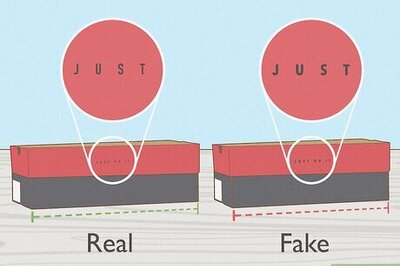
views
X
Expert Source
Beverly UlbrichDog Behaviorist & Trainer
Expert Interview. 30 January 2020.
However, the recognition and management of pain in senior dogs in critical to helping your four-legged friend live a long and healthy life. Becoming aware of changes in your dog's behavior, as well as physical changes, will help you know if your senior dog is in pain.
Looking for Behavioral Changes in Your Senior Dog

Watch out for aggression. If your senior dog becomes aggressive, it could be a sign that they are in pain. Warning signs of aggression as a result of pain can include growling or pinning back their ears. Be particularly aware of behaviors like biting as a response to touching particular areas, as this can be an indicator your senior dog is in pain.

Look out for localized grooming. If your dog is excessively licking an area, it could be an indicator that they are in pain. This is often the case with senior dogs suffering from localized pain caused by conditions like arthritis or other orthopedic problems that are common in older dogs.

Monitor your senior dog's sleep patterns. If your dog is restless, has trouble falling asleep, or is up all night, it could be a sign that they are in pain. Changes in your older dog's sleep patterns can indicate larger medical issues. Take notes of any changes in your dog's sleep patterns and be sure to talk to your vet, who can help you determine if these changes are rooted in pain or an underlying medical issue.

Watch out for changes in eating or drinking patterns. A change in how, when, or how much food and water your dog consumes can be an indication that they are experiencing pain. Medical conditions like arthritis or dental disease are common in senior dogs, causing pain and changing your dog's eating and drinking habits.

Pay attention to changes in vocalizations. If your senior dog is whining, crying, or barking excessively or uncontrollably, it could be an indicator that they are in pain. If your dog's vocalizations seem out of the ordinary, it could mean they are experiencing pain from an underlying medical issue.

Notice if your senior dog has difficulty sitting, lying down, and staying put. Restlessness is often a sign of pain in senior dogs. If your pooch is having trouble getting comfortable, it could indicate they are in pain.

Look out for lethargy. If your senior dog becomes lethargic, this could be a sign that they are experiencing pain. Weakness and lethargy can indicate an underlying medical condition in senior dogs, such as a tumor, osteoarthritis, or heart disease, and can be the cause of significant pain.
Looking for Physical Changes in Your Senior Dog

Monitor your dog's breathing patterns. Changes in your dog's breathing patterns could be a sign that your pooch is in pain. Heavy breathing, gagging, or a persistent cough are all indicators your senior dog could be experiencing pain.

Examine your senior dog's eyes. Look at your dog's pupils and note if they seem larger, or more dilated. More dilated pupils, as well as smaller, or more constricted, pupils can be a sign of pain in the eye or elsewhere in the body. Also beware of squinting or bloodshot eyes, as both can indicate your senior dog is in pain.

Check for changes in posture. If your dog is limping or dragging one of their legs, they could be in pain. Similarly, tensing their abdominal and back muscles to create a tucked up or hunched appearance might indicate they are suffering from pain.

Look for changes in your senior dog's mobility. If you notice changes in your dog's mobility, such as having trouble going up and down stairs, or experiencing difficulty running and jumping, it could mean they are in pain. Underlying issues like arthritis could be causing these changes in your pet's mobility and triggering pain.



















Comments
0 comment